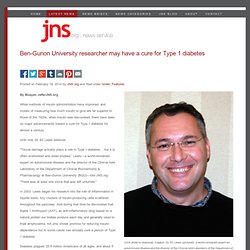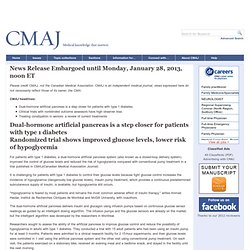

Ben-Gurion University researcher may have a cure for Type 1 diabetes — JNS.org. Since AAT was already approved by the Food and Drug Administration (FDA), it received fast-track approval into human clinical trials in the U.S., Lewis said, noting it still will take at least another two years for AAT to receive FDA approval as an on-label treatment for Type 1 diabetes.

But some physicians have been prescribing it in the meantime as an off-label treatment. Dana Heffernan’s son Zach, 11, received AAT treatment from his doctor in San Antonio, Texas. Heffernan said her son was diagnosed on Nov. 12, 2013 and received his first treatment in mid-December. “He went from approximately 10 units of insulin per day [70 units per week] down to two units per week. So that is pretty significant. In another public case, which Lewis discussed, the Consul General of Israel to the Pacific Northwest, Andy David, accessed AAT for use in treating his 9-year-old daughter. The treatment, however, may not be effective for all patients. “We’re not out of the woods,” said Lewis. Google reveals smart contact lens prototype designed to aid diabetics.
Dairy products and the risk of type 2 diabetes: a systematic review and dose-response meta-analysis of cohort studies. Marijuana tied to better blood sugar control. By Genevra Pittman NEW YORK (Reuters Health) - People who had used marijuana in the past month had smaller waists and lower levels of insulin resistance - a diabetes precursor - than those who never tried the drug, in a new study.

The findings, based on surveys and blood tests of about 4,700 U.S. adults, aren't enough to prove marijuana keeps users thin or wards off disease. And among current pot smokers, higher amounts of marijuana use weren't linked to any added health benefits, researchers reported in The American Journal of Medicine . "These are preliminary findings," said Dr. Murray Mittleman , who worked on the study at Beth Israel Deaconess Medical Center in Boston. "It looks like there may be some favorable effects on blood sugar control, however a lot more needs to be done to have definitive answers on the risks and potential benefits of marijuana usage. " The new study used data from a national health survey conducted in 2005-2010. Dr. Cannabis - THC. Rare-gene-protects-against-type-2-diabetes-even-in-obese-people. Nanotechnology could help fight diabetes: Injectable nanogel can monitor blood-sugar levels, secrete insulin when needed.
Injectable nanoparticles developed at MIT may someday eliminate the need for patients with Type 1 diabetes to constantly monitor their blood-sugar levels and inject themselves with insulin.

The nanoparticles were designed to sense glucose levels in the body and respond by secreting the appropriate amount of insulin, thereby replacing the function of pancreatic islet cells, which are destroyed in patients with Type 1 diabetes. Ultimately, this type of system could ensure that blood-sugar levels remain balanced and improve patients' quality of life, according to the researchers. "Insulin really works, but the problem is people don't always get the right amount of it. With this system of extended release, the amount of drug secreted is proportional to the needs of the body," says Daniel Anderson, an associate professor of chemical engineering and member of MIT's Koch Institute for Integrative Cancer Research and Institute for Medical Engineering and Science.
Mimicking the pancreas. News release: Artificial pancreas a step closer for patients with type 1 diabetes; Observer bias in clinical trials; Constipation in seniors. Please credit CMAJ, not the Canadian Medical Association.

CMAJ is an independent medical journal; views expressed here do not necessarily reflect those of its owner, the CMA. CMAJ headlines: Dual-hormone artificial pancreas is a step closer for patients with type 1 diabetes Clinical trials with nonblinded outcome assessors have high observer bias Treating constipation in seniors: a review of current treatments For patients with type 1 diabetes, a dual-hormone artificial pancreas system (also known as a closed-loop delivery system) improved the control of glucose levels and reduced the risk of hypoglycemia compared with conventional pump treatment in a trial published in CMAJ(Canadian Medical Association Journal).
It is challenging for patients with type 1 diabetes to control their glucose levels because tight glucose control increases the incidence of hypoglycemia (dangerously low glucose levels). In a related commentary, Drs. Or Contact for interviews Dr.